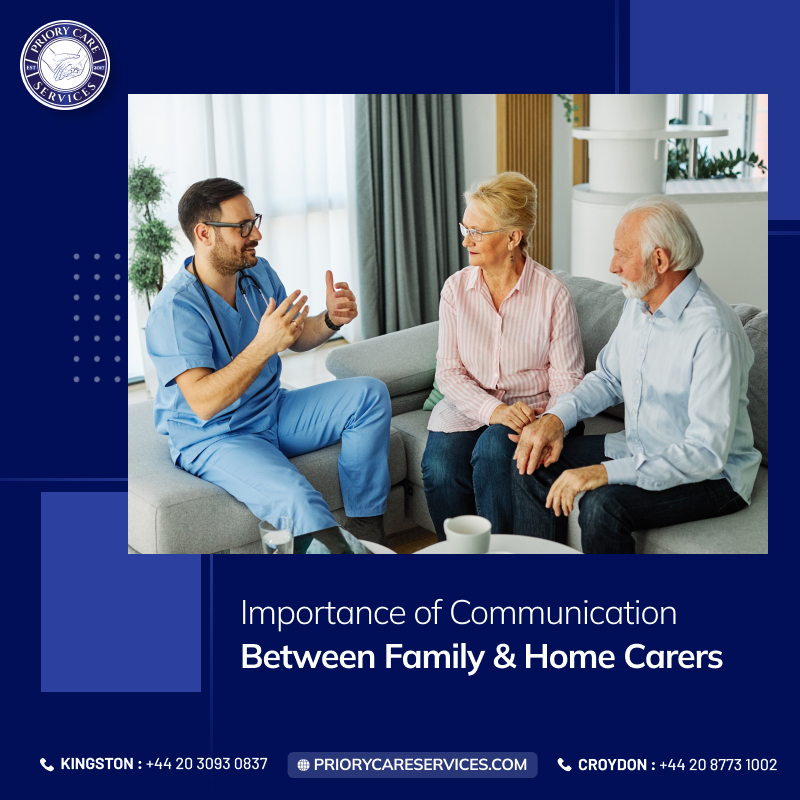For loved ones receiving home-based caregiving services, one can ensure the best care only when the families and home care providers communicate effectively. Any reputed home care agency in Kingston Upon Thames, Bromley, or Croydon would be known to employ caregivers with professional communication skills.
The caregiving service can be for an elderly family member, a patient recovering from surgery, or someone with a chronic illness. Regardless, keeping lines of communication open and constant between family members and carers fosters a cooperative atmosphere. This blog outlines the significance of communication between home carers and families.
The Role of Communication for Home Care Agencies
Building Trust and Understanding
Building trust is an important part of communication between families and home care providers. Even if families do not have the time to look after the patient, they can participate in the care process. This way they are kept informed about their loved one’s health and progress, so as to have greater confidence in the quality of care provided. This trust alleviates anxiety and uncertainty for both the patient and their family members.
Consistent and regular communication lets families fully comprehend the treatment plan and be aware of what is being done. As a family member, you must feel included in the decision-making process when it comes to food preferences, prescription regimens, or certain exercises. A more relaxed environment can be achieved with this reciprocal understanding between families and carers. This also makes sure that everyone agrees with a decision.
Tailoring Care to Individual Needs
Every person has distinct care needs, and even that can change with time. Clear communication apart from qualifications and training allows domestic caregivers to know and understand these demands better and customise their services as needed. For example, some patients might need specialised care for illnesses such as Alzheimer’s or Parkinson’s. And some others may be limited to support requirements due to mobility issues or specific nutritional needs.
Home care providers can modify their approach and offer individualised care that meets the patient’s changing needs when families share these facts with them. It is better if the patient is able to communicate properly, and that helps gather direct feedback and instructions as to how and what they want. The things caregivers should know are the patient’s daily habits, likes, dislikes, and preferences. For more skilful adjustment, families can keep on providing valuable updates about the patient’s routines or any subtle behavioural changes.
Ensuring Consistency and Continuity of Care
Many home care providers in Croydon, Bromley, and Kingston Upon Thames work in rotating shifts in the patient’s house. Lack of clear communication due to this shift working can result in care gaps or discrepancies. Families may help bridge this gap by ensuring that detailed records and updates are shared among carers. This makes sure that the continuity of care is maintained when one caregiver takes up after the one that leaves.
A family member could, for instance, keep a daily journal of the patient’s condition, prescriptions, and any symptoms or worries. The caregivers, whoever’s turn it is, can study it before their shift starts. Families can mainly guarantee constant adherence to the care plan, avoid misunderstandings, and improve health outcomes. And they can do so by keeping the lines of communication open.
Addressing Concerns and Resolving Issues
Communication is also essential for immediately addressing concerns or solving issues that can occur during any caregiving shift. If the family has any issues about the quality of care, they can express them as soon as possible so that the home care provider can address them before conditions worsen. On the other hand, if the caregiver themselves detects something disturbing the patient’s health or behaviour, they can alert the family without hesitation. This is important to allow you and your family to take immediate action.
Both carers and family members should know what to do in the event of an emergency, such as a fall or a rapid change in health. So to prevent worsening of the situation, families and home carers should also talk about contingency plans before service tenure begins. Better coordination is only possible through open communication, which also guarantees that everyone is ready to handle all unforeseen situations.
Conclusion
A certified home care agency in Kingston Upon Thames, Croydon, or Bromley would absolutely understand the value of communication between families and caregivers. This is because it fosters trust and satisfaction and encourages consistency in care with rapid response to concerns.
Families and carers can collaborate to offer the highest quality care for their loved ones by creating an environment of mutual respect and transparency. And if you are looking for a home caregiver yourself and value communication as well, contact Priory Care Services. Get in touch with us and ensure good quality caregiving services.




